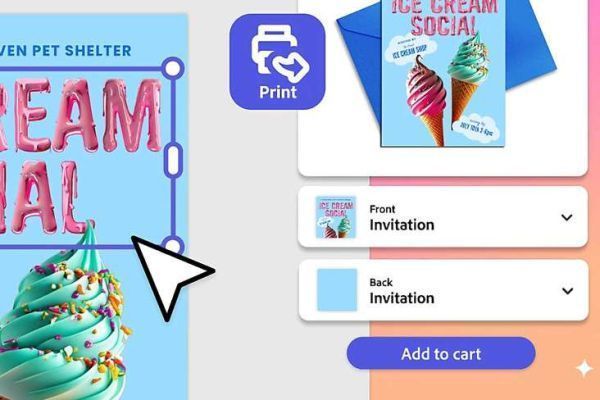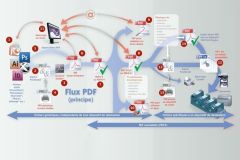Adobe recently announced a collaboration with Zazzle, aimed at integrating print ordering options into Adobe Express. With this feature, users can not only design, but also order printed products, such as cards or T-shirts, directly from within the application. However, this move has raised concerns among printers and designers who feel let down by the publisher, worried about Adobe playing the role of intermediary in a traditionally independent sector.
Customers baffled by Zazzle partnership
Zazzle, a player in the print-on-demand market, now handles the complete processing of orders generated on Adobe Express, from printing to delivery. This partnership reduces users' dependence on local printers or their own printing solutions, pushing them towards a unified platform where Adobe presents itself as both a creative tool and a printing facilitator. For many customers, this choice of Adobe looks like a disengagement from professional standards, limiting autonomy and personalized printing choices.
A conflict of interest with the printing community?
With this expansion, Adobe is no longer content to simply provide a creative tool. The company now also directly facilitates print orders. This initiative is perceived as curtailing the diversity of production options available to customers, centralizing services usually provided by local or specialized printers. This conflict of interests could exacerbate tensions, as Adobe gradually appears to be occupying a monopolistic position, to the detriment of printers who see part of their market redirected towards this unified platform.
New capacity deemed out of step with creative expectations
Loyal Adobe users, especially those working in professional creative environments, have reservations about this new direction. With functionalities limited to the products offered by Zazzle, Adobe's tool could reduce the range of possibilities that are at the heart of creative people's expectations. By preferring standardized printing, Adobe runs the risk of coming up against the expectations of demanding customers who appreciate the creative freedom afforded by specialized printers, capable of responding to customized, high-quality requests.
The zero-commission model: real strategy or marketing bait?
Aubrey Cattell announced that Adobe would take no commission for external print partners, raising doubts about the sincerity of this promise.
While for the time being, Adobe assures us that it does not receive any commission on orders, informed observers are questioning the long-term viability of such a model. The risk of Adobe introducing a remuneration model for these services remains at the forefront of concerns, with the impression that this is above all a seduction phase to attract users to Adobe Express. The fact that Adobe reserves the right to modify this model at any time could be a further source of insecurity.
Recent changes to Adobe's offering: the last straw for customers?
The inclusion of Pantone colors, now chargeable in Adobe Creative Cloud with Pantone Connect, had already sent shockwaves through the creative community. This new print functionality is the latest in a series of decisions perceived as maneuvers to control new market segments. By moving towards consumer printing to the detriment of the quality and technical standards prized by professionals, Adobe seems to be diverting part of its core customer base in order to reposition itself as a global player in made-to-order creation.
This move by Adobe could mark a turning point for the printing industry. It remains to be seen whether users, especially industry professionals, will accept this transformation. Ironically, in the same week, Apple has signed an agreement to acquire Pixelmator a serious competitor to Photoshop!













